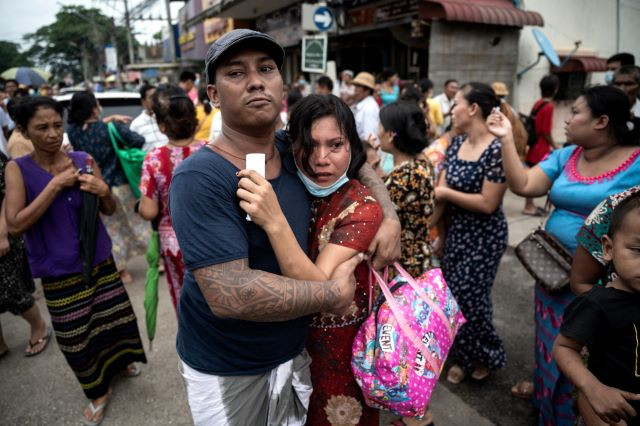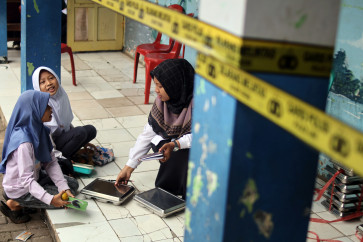Popular Reads
Top Results
Can't find what you're looking for?
View all search resultsPopular Reads
Top Results
Can't find what you're looking for?
View all search resultsPolitical woes in the Mekong region help Myanmar junta survive
Thailand can inspire the military junta in Myanmar to cling to power and prevent the democratically elected government of Aung San Suu Kyi from making a comeback.
Change text size
Gift Premium Articles
to Anyone
F
ive of the 10 ASEAN member states that share the Mekong River, Myanmar, Thailand, Cambodia, Vietnam and Laos, have a problem with democracy. Myanmar is ruled by a military junta known for atrocities against own people, Thailand’s military plays a dominant role in politics, the Hun Sen family monopolizes power in Cambodia, while in Vietnam and Cambodia secretive power struggles are under way.
The military junta in Myanmar reaps the most benefit of the undemocratic environment in its neighboring countries. It is very clear that under the current situation in the five predominantly Buddhist nations, Indonesia, as this year's chair of ASEAN, has little chance of making any progress in convincing Myanmar's junta leader Gen. Min Aung Hlaing to heed the five-point consensus (5PC) he signed in the ASEAN emergency summit in Jakarta in April 2021.
In the meantime, four other ASEAN members, Indonesia, Malaysia, Singapore and the Philippines, are politically stable, economically flourishing and have democracies that work relatively well, albeit on paper. Brunei is an exception because the tiny but resource-rich nation is a monarchy that allows Sultan Hasanal Bolkiah to wield absolute power.
The four nations are taking a hardline stand on the Myanmar junta, as evident in their consistency in barring the junta from any ASEAN official meeting until it respects the 5PC as the path to bring peace and democracy back to Myanmar.
Timor-Leste is an inch closer to becoming an ASEAN member, but there is not much the grouping can expect from the former Indonesian colony to make a difference in the bloc’s quest to solve the Myanmar crisis. Last month, Timor-Leste Prime Minister Xanana Gusmao shocked ASEAN with his threat to withdraw the country’s bid to join the bloc if it fails to immediately stop atrocities in Myanmar.
Thailand
Political turmoil looks to continuously characterize the region, with Thailand stealing the show following the return of former prime minister Thaksin Shinawatra after years of self-exile. He arrived in Bangkok on the day when real estate tycoon Srettha Thavisin was elected the 30th prime minister. Srettha, 60, nominated by Thaksin's Pheu Thai Party, won 482 of the 747 votes in the Thai bicameral parliament.
Srettha’s election ended three months of political deadlock that stemmed from the military’s resistance to the nomination of Pita Limjaroenrat, whose Move Forward Party won the most votes in the May election (but fell short of enough parliamentary seats to form a government).
Political stability is unlikely to last long in Thailand because Thaksin will be unable to resist the temptation to control the country again. For sure the military and supporters of the monarch will prevent Thaksin from regaining power.
Thaksin fled the country 15 years ago after the military ousted him in a coup. In the May election, his party finished second, but eventually managed to form a government thanks to the strong support of pro-military parties, the Palang Pracharath and the United Thai Nation Party.
How Thai politics will unfold only time will tell, but the good news is the economy looks to remain unaffected and continue growing. The bad news is Thailand can inspire the military junta in Myanmar to cling to power and prevent the democratically elected government of Aung San Suu Kyi from making a comeback.
Cambodia
The Myanmar junta will also count on newly elected Cambodian Prime Minister Hun Manet because the new leader, like his father, Hun Sen, regards the crisis in Myanmar as an internal matter in which ASEAN cannot interfere for whatever reason.
Hun Manet, an Army general, will likely emulate his father’s authoritarian system that enabled him to rule the country for 38 years and dismantle the once powerful royal monarch. An iron-fist government will allow Hun Manet to control the country.
Hun Sen's Cambodia's People Party (CPP) won 120 of the 125-seat National Assembly in the July general elections, while the pro-royal FUNCINPEC took the remaining seats. Even before the election, Hun Sen had announced his choice of his 45-year-old son as successor.
A West Point, United States, military academy graduate, Hun Manet gained a master's degree from New York University and a doctorate from Britain's Bristol University, both in economics.
Hun Sen will remain the boss of the ruling CPP and reportedly will become the head of the Senate and the Supreme Council of the King.
Vietnam
In Vietnam, President Nguyen Xuan Phuc resigned in January amid growing corruption and abuse-of-power accusations from within the Communist Party. As a local news outlet reported, the Communist Party said Phuc was politically responsible for the violations and wrongdoing of numerous officials under him.
"As he was well aware of his responsibilities to the party and the people, Phuc filed a request to resign from his positions and retire," the party said in a statement.
It is not easy to understand Vietnamese politics because major decisions are made behind closed doors. Reports have it there are growing rivalries between pro-Western/foreign investment and the party hardliners.
Vietnam's National Assembly named Vo Van Thuong, 52, as the country's new president in a reshuffle of the country's top leadership in March, amid a sweeping antigraft campaign. The president is largely a ceremonial post, but it is one of the top-four political positions in Vietnam.
Thuong is widely described as the lieutenant of the Communist Party General Secretary Nguyen Phu Trong, Vietnam's most powerful figure and the man behind the anticorruption drive.
Vietnam is a close friend of Myanmar's junta but has refrained from publicly announcing its stance.
Laos
Lao Prime Minister Phankham Viphavanh, 72, resigned in May for health reasons. His abrupt departure came two years after he was appointed to the job for another five years and at a time when the land-locked nation endured high inflation, which now nears 40 percent, and a sharp depreciation of the local currency, the kip.
"In the current situation, our country is experiencing a lot of hardships. I can't do this difficult job any further," the PM told the Lao National Assembly.
President Thongloun Sisoulith, also general secretary of the Lao People's Revolutionary Party, appointed deputy prime minister Sonexay Siphandone the new prime minister.
Unless changes sweep across the Mekong River region, it is almost impossible to expect ASEAN leaders to unite in dealing with the humanitarian crisis in Myanmar. The best Indonesia as the ASEAN chair can do is to keep the junta from all regional meetings, a policy that has hardly solved the Myanmar quandary.
***
The writer is senior editor at The Jakarta Post.











